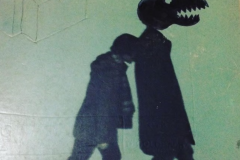This is Mensa Deathsquad‘s third full-length release and it’s something that I’m sure no one expected or is expecting. Filled with electronic vibrancy, Personal Book Of Spells bounces with the punk enthusiasm of a young teen discovering fire. What could be the musical love child of Erasure and Depeche Mode, the album is occasionally fitted with EDM rhythms that never let up and never ostracize the pop sensibilities from track to track.
Cor De Lux – Media
Not sure if the world is ready but it may have to be. While some genres have fallen away from popularity, they’ve never truly diminished away into obscurity. Goth-tinged, shoegaze, and somewhat post-punk, groups like Cor De Lux won’t be found often but when they do come along, they better deliver something more eloquent than a ripped-up rendition of their predecessors that have paved the way in order for them to get this far. I digress. The group, originally formed back in 2018, has just released its debut full-length release Media, with at least five of the tracks released as singles within the last couple of years. But what about the music? We’ll get there.
The North Carolina outfit does explore terrain that’s somewhat ethereal in its base, reverberating through every track. It’s a production quality and it suits the band. Cor De Lux does sound expansive, huge some might contend, and it takes a minute before we can grasp onto the wave it’s riding. Throughout “Idol Season,” the band takes a moment before it all gels but it comes together quickly as does “Future,” which is sometimes mired in nostalgia. It’s not necessarily a bad thing but guitarist Tim Lusk shouts “Welcome to the future!” it’s as if suddenly we’re transported somewhere, or sometime, else. But as soon as “Whose Side” opens, with its thudding percussion and repetitive bassline, yes, I’m game. I’m in. Here’s where vocalist/guitarist Dawn Moraga moves in a different direction, giving more than just a spoken vocal delivery, which is more of what Cor De Lux needs and shouldn’t shy away from. The melody at just that one moment changes perspectives.
Don’t get me wrong, the band can rock as “Snap Out Of It” shows, as it easily controls its instruments. And allows for washes of dual guitars splattering across the canvas created by its rhythm section of John Bliven and Thomas McNeely. But it’s within “Slogans” where the band seems to loosen up as Lusk and Moraga share vocal duties. They’re intentional and a bit more dynamic at this point. The band closes with “Ships” where Moraga’s voice isn’t usually more than a whisper but we know she has more to offer.
While Media is a good release, one can’t help but wonder if Cor De Lux is holding back. I’d like to see a bit more experimentation and hear the band cut loose freely and with abandon. I’m sure they’d like to be as powerful as I believe they can be.
Facebook | Twitter | Instagram
Quasi – Breaking The Balls Of History
If there was ever any question about the end of times, maybe this is it. Politicians vying for visibility, groups reviving hate speech from one country to the next, climate change, and some even worry about the extinction of their lack of melanin(?) Go figure. Now, after 10 years the unrelenting duo of Janet Weiss (Sleater-Kinney, Jicks) and Sam Coomes (Heatmiser, Donner Party) find themselves revitalized within the Quasi world they’ve worked for so long on. We’re definitely closer to the end at least. And so, the band has returned with its 10th album, Breaking The Balls Of History (Sub Pop), reinvigorated and revitalized, once again with Weiss on drums and Coomes doing his thing on guitar, Rocksichord, and bass.
Let’s be real here, Quasi is a punk band with an ethos all its own and a musical flair for the dramatic. But through the din of noisiness lying underneath is the band’s penchant for pop explosiveness. Quasi has always encapsulated sweet harmonies and melody gracefully within it all, and it seems with Breaking The Balls Of History things aren’t that much different. The musicality of “Last Long Laugh,” encompasses everything as it leads the way with humming keys in the background as Weiss’ consistent thud on her bass drum finds its rhythm before the duo plays with dynamics. Coomes’ poetic phrasing keeps you guessing as his off-kilter keyboard excursions stylishly slip into oblivion. Quasi flows with an utterly concise rhythm and Weiss shares much more than a percussive edge, applying vocal harmonies to Coomes’ lead. Yes, the group starts off strong and impressively. Some of Coomes’ keyboard noodlings are sometimes reminiscent of Tim Taylor, which is more of an observation than a comparison, but we then find “Back In Your Tree” filling out much like what we think a Quasi track would sound like. The low-end bass theory of his keyboard shifts with the inclusion of the guitar interplay but I’m left wondering, as I’m sure you will, about who’s actually going to space here.
It’s difficult not to fall in love with the world Quasi has created and existed within for so long as songs are injected with sweet bubblegum pop harmonies that are unrelentingly catchy, and smothered in sugary sweetness. Whether the band is moving at a mid-tempo pace on “Gravity” or elevating the power on “Riots & Jokes,” it’s in there. But it’s the title where there’s less of it as Coomes is fully energized as he shouts “I’d rather be BREAKING THE BALLS OF HISTORY!” This is where it shifts but only momentarily leading directly into “Doomscrollers.” Now the band has never been viewed as political in any way but here, the duo seems to have taken notes, viewing everything they’ve seen (climate deniers, virtual education, anti-vaxxers, faux patriotism, Covid, keyboard warriors, etc.), and put it into song in possibly one of the greatest tracks of the album. The song is beautifully constructed and when Coomes sings “no fairytale,” we know we’re living in a reality no one wants to live within.
On the expansive “Inbetweeness” the group takes a different approach. A rhythm is ridden and capitalized on, drifting endlessly. It’s eerie and haunting but nonetheless inviting. With “Nowheresville,” it seems the band dives in again capturing the imagery of violence we’ve all witnessed the last couple of years within this thick kaleidoscope of sound.
Honestly, there’s so much to unpack on Breaking The Balls Of History, offering a wide variation of prose, both abstract and direct as Quasi lifts the energy here at just about every turn. Silent for a decade, the band hasn’t lost a step and begins where it left off leaving listeners both thrilled and confused. What else could you possibly want from a band????
Facebook | Twitter | Instagram
Yo La Tengo – This Stupid World
Are there certain things that blow your mind from time to time? It’s about perseverance. It’s about never relinquishing who or what you are. It’s about delivering. EVERY. FUCKING. TIME. But this is also about Yo La Tengo, the trio of musicians consisting of guitarist Ira Kaplan, bassist James McNew, and drummer Georgia Hubley, and the band’s almost 40-year existence! Throughout the years – no, scratch that – throughout the decades, YLT has been a group about experimentation but never wavering on its love for melody or classic pop song structures. Whether measured through a barrage of noisy instruments or acoustic guitars, there’s always something vibrant found within the albums it’s released, and this time with the self-produced This Stupid World (Matador Records), it seems things haven’t changed in that respect, as the group continues to evolve and transcend expectations.
Since I’ve already given away what This Stupid World is like, we may as well dive into it. The album offers a barrage of techniques through the variety of styles within, beginning eloquently with “Sinatra Drive Breakdown,” drenched in distortion, filled with dissonance but never forsaking its melody as Kaplan and Hubley quietly sing over its hypnotic tendencies. While the track clocks in at over the 7-minute mark, it’s barely noticeable and no one would ever ask the group to shorten it. In fact, lengthening the song I’m sure no one would be against either. Dissonant melodies invade “Fallout,” but Kaplan’s voice never overtakes it and blends in easily never overtaking the power of the song itself. Here, we get the best of both YLT worlds; the beautiful melodies and the stormy instruments vying for dominance as vocal harmonies obliterate both. Or do they?
We all need to remember, with Yo La Tengo you should never expect just one thing as the group has a way of monkeywrenching any misconstrued conceptions. The slower and softer “Aselestine” might just be that. Acoustic guitars keep the song mostly grounded with Hubley taking the lead on this one as she’s done in the past through other compositions, and the song will not be denied! Its gorgeous movement slides around as electric guitars echo in the background while Hubley’s hushed vocals never have the need to raise the roof throughout it. YLT songs might be repetitive but never repetitious. “Until It Happens” burrows deep into a particular rhythm & melody but it seems both delicate and abrasive at the same time until its eventual and abrupt end. “Apology Letter” somewhat does the same, but the delivery is slightly different as Kaplan offers the apology through his words, utilizing the music as the canvas for it.
Yo La Tengo isn’t averse to creating sonic oblivion-like soundscapes, which have the band moving full throttle on the overdriven distortion. The melody is wrapped neatly within it and you get the feeling the band never wants to let go of it…but neither do we. The band moves differently on the closing “Miles Away” though as washes of guitars glide atmospherically alongside Hubley’s ethereal and haunting vocal delivery. Stylistically it might be different than other songs, but it fits into YLT’s aesthetics.
While all the young guns find comfort in conformity, that’s never been the Yo La Tengo way. The band’s simple mannerisms through the musical landscapes it creates always seem to shift slightly into directions we can never anticipate. This Stupid World doesn’t fail in expectations, and we can only guess where they’re going next.









Social Media